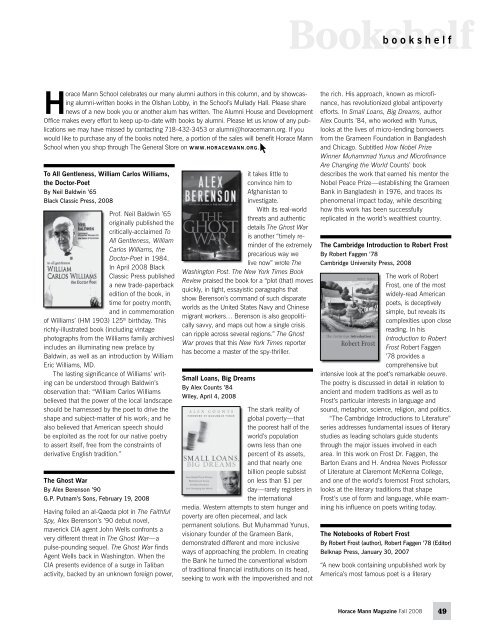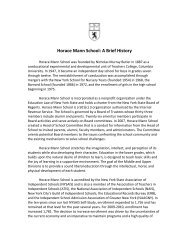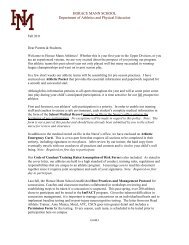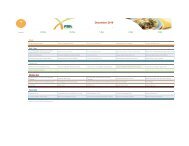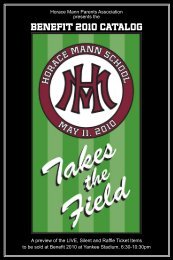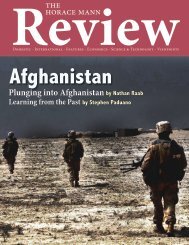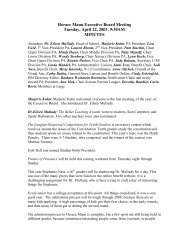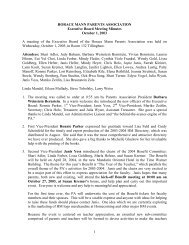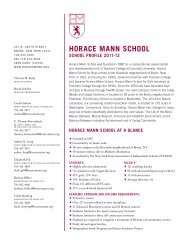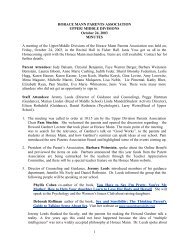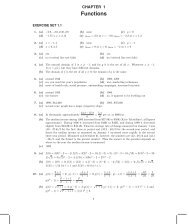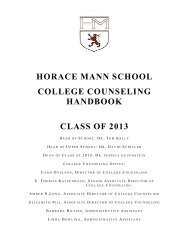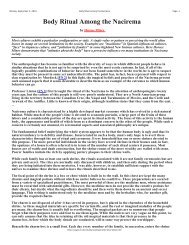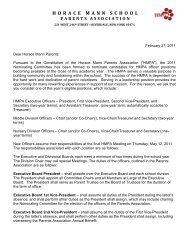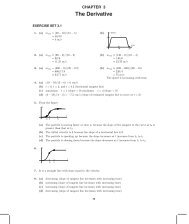You also want an ePaper? Increase the reach of your titles
YUMPU automatically turns print PDFs into web optimized ePapers that Google loves.
Bookshelf<br />
bookshelf<br />
<strong>Horace</strong> <strong>Mann</strong> School celebr<strong>at</strong>es our many alumni authors in this column, and by showcasing<br />
alumni-written books in the Olshan Lobby, in the School’s Mullady Hall. Please share<br />
news of a new book you or another alum has written. The Alumni House and Development<br />
Office makes every effort to keep up-to-d<strong>at</strong>e with books by alumni. Please let us know of any public<strong>at</strong>ions<br />
we may have missed by contacting 718-432-3453 or alumni@horacemann.org. If you<br />
would like to purchase any of the books noted here, a portion of the sales will benefit <strong>Horace</strong> <strong>Mann</strong><br />
School when you shop through The General Store on www.horacemann.org.<br />
To All Gentleness, William Carlos Williams,<br />
the Doctor-Poet<br />
By Neil Baldwin ’65<br />
Black Classic Press, 2008<br />
Prof. Neil Baldwin ’65<br />
originally published the<br />
critically-acclaimed To<br />
All Gentleness, William<br />
Carlos Williams, the<br />
Doctor-Poet in 1984.<br />
In April 2008 Black<br />
Classic Press published<br />
a new trade-paperback<br />
edition of the book, in<br />
time for poetry month,<br />
and in commemor<strong>at</strong>ion<br />
of Williams’ (HM 1903) 125 th birthday. This<br />
richly-illustr<strong>at</strong>ed book (including vintage<br />
photographs from the Williams family archives)<br />
includes an illumin<strong>at</strong>ing new preface by<br />
Baldwin, as well as an introduction by William<br />
Eric Williams, MD.<br />
The lasting significance of Williams’ writing<br />
can be understood through Baldwin’s<br />
observ<strong>at</strong>ion th<strong>at</strong>: “William Carlos Williams<br />
believed th<strong>at</strong> the power of the local landscape<br />
should be harnessed by the poet to drive the<br />
shape and subject-m<strong>at</strong>ter of his work; and he<br />
also believed th<strong>at</strong> American speech should<br />
be exploited as the root for our n<strong>at</strong>ive poetry<br />
to assert itself, free from the constraints of<br />
deriv<strong>at</strong>ive English tradition.”<br />
The Ghost War<br />
By Alex Berenson ’90<br />
G.P. Putnam’s Sons, February 19, 2008<br />
Having foiled an al-Qaeda plot in The Faithful<br />
Spy, Alex Berenson’s ’90 debut novel,<br />
maverick CIA agent John Wells confronts a<br />
very different thre<strong>at</strong> in The Ghost War—a<br />
pulse-pounding sequel. The Ghost War finds<br />
Agent Wells back in Washington. When the<br />
CIA presents evidence of a surge in Taliban<br />
activity, backed by an unknown foreign power,<br />
it takes little to<br />
convince him to<br />
Afghanistan to<br />
investig<strong>at</strong>e.<br />
With its real-world<br />
thre<strong>at</strong>s and authentic<br />
details The Ghost War<br />
is another “timely reminder<br />
of the extremely<br />
precarious way we<br />
live now” wrote The<br />
Washington Post. The New York Times Book<br />
Review praised the book for a “plot (th<strong>at</strong>) moves<br />
quickly, in tight, essayistic paragraphs th<strong>at</strong><br />
show Berenson’s command of such dispar<strong>at</strong>e<br />
worlds as the United St<strong>at</strong>es Navy and Chinese<br />
migrant workers… Berenson is also geopolitically<br />
savvy, and maps out how a single crisis<br />
can ripple across several regions.” The Ghost<br />
War proves th<strong>at</strong> this New York Times reporter<br />
has become a master of the spy-thriller.<br />
Small Loans, Big Dreams<br />
By Alex Counts ’84<br />
Wiley, April 4, 2008<br />
The stark reality of<br />
global poverty—th<strong>at</strong><br />
the poorest half of the<br />
world’s popul<strong>at</strong>ion<br />
owns less than one<br />
percent of its assets,<br />
and th<strong>at</strong> nearly one<br />
billion people subsist<br />
on less than $1 per<br />
day—rarely registers in<br />
the intern<strong>at</strong>ional<br />
media. Western <strong>at</strong>tempts to stem hunger and<br />
poverty are often piecemeal, and lack<br />
permanent solutions. But Muhammad Yunus,<br />
visionary founder of the Grameen Bank,<br />
demonstr<strong>at</strong>ed different and more inclusive<br />
ways of approaching the problem. In cre<strong>at</strong>ing<br />
the Bank he turned the conventional wisdom<br />
of traditional financial institutions on its head,<br />
seeking to work with the impoverished and not<br />
the rich. His approach, known as microfinance,<br />
has revolutionized global antipoverty<br />
efforts. In Small Loans, Big Dreams, author<br />
Alex Counts ’84, who worked with Yunus,<br />
looks <strong>at</strong> the lives of micro-lending borrowers<br />
from the Grameen Found<strong>at</strong>ion in Bangladesh<br />
and Chicago. Subtitled How Nobel Prize<br />
Winner Muhammad Yunus and Microfinance<br />
Are Changing the World Counts’ book<br />
describes the work th<strong>at</strong> earned his mentor the<br />
Nobel Peace Prize—establishing the Grameen<br />
Bank in Bangladesh in 1976, and traces its<br />
phenomenal impact today, while describing<br />
how this work has been successfully<br />
replic<strong>at</strong>ed in the world’s wealthiest country.<br />
The Cambridge Introduction to Robert Frost<br />
By Robert Faggen ’78<br />
Cambridge University Press, 2008<br />
The work of Robert<br />
Frost, one of the most<br />
widely-read American<br />
poets, is deceptively<br />
simple, but reveals its<br />
complexities upon close<br />
reading. In his<br />
Introduction to Robert<br />
Frost Robert Faggen<br />
’78 provides a<br />
comprehensive but<br />
intensive look <strong>at</strong> the poet’s remarkable oeuvre.<br />
The poetry is discussed in detail in rel<strong>at</strong>ion to<br />
ancient and modern traditions as well as to<br />
Frost’s particular interests in language and<br />
sound, metaphor, science, religion, and politics.<br />
“The Cambridge Introductions to Liter<strong>at</strong>ure”<br />
series addresses fundamental issues of literary<br />
studies as leading scholars guide students<br />
through the major issues involved in each<br />
area. In this work on Frost Dr. Faggen, the<br />
Barton Evans and H. Andrea Neves Professor<br />
of Liter<strong>at</strong>ure <strong>at</strong> Claremont McKenna College,<br />
and one of the world’s foremost Frost scholars,<br />
looks <strong>at</strong> the literary traditions th<strong>at</strong> shape<br />
Frost’s use of form and language, while examining<br />
his influence on poets writing today.<br />
The Notebooks of Robert Frost<br />
By Robert Frost (author), Robert Faggen ’78 (Editor)<br />
Belknap Press, January 30, 2007<br />
“A new book containing unpublished work by<br />
America’s most famous poet is a literary<br />
<strong>Horace</strong> <strong>Mann</strong> Magazine Fall 2008<br />
49


